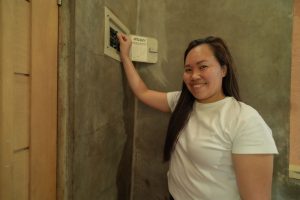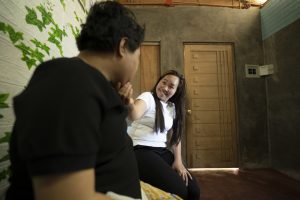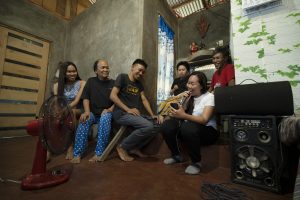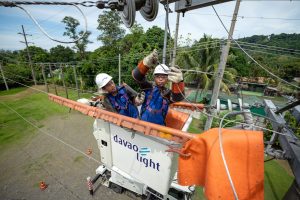
Analou Mamalias, 33, is the third of eight siblings from a family of farmers in Barangay Malabog, Paquibato District, a developing hinterland in Davao City. While she grew up surrounded by an abundance of natural resources, with her family cultivating cash crops year-round, they lacked an essential commodity to modern-day living: electricity.
“Alas kuwatro pa lang magluto na og panihapon kay mangaon mi og sayo. Pagkilom-kilom na manghigda mig og sayo kay wala may kuryente para sa suga. Usahay dili pud mi kapalit og gas para sa lampara,” she recalled.
(We cooked our dinner at 4 o’clock in the afternoon to eat early. As dusk fell, we immediately went to bed because there’s no electricity for the light. Sometimes, we cannot afford to buy gasoline for our lamp.)
When they were younger, she and her siblings had to study under the dim glow of the lamp and had to go home early after school to avoid walking in the dark. The whole situation was significantly harder for their younger sister, who is afflicted by nonverbal autism.

“Kapila naman siya nawala. Ngitngit na sa balay unya nanghigda nami. Ninggawas na diay siya ug ninglakaw,” Analou shared.
(She has disappeared many times. It usually happens after dark when we are already in bed and asleep, and she slips out to wander.)
Neighbors, both Bisaya and indigenous peoples, guide her sister back home when they find her wandering in their properties and lands. But sometimes, the search becomes more difficult when she wanders farther away in unfamiliar grounds.
There was a time when their sister walked several kilometers into another barangay in Paquibato. Their family and neighbors spent the night searching. Thankfully, Analou received word of her sister’s whereabouts from the barangay captain of a neighboring town, who took her sister in after the locals found her.

The incident, among other hardships, is one of Analou’s strongest motivators to provide a better future for her family. She completed her studies in Hotel and Restaurant Management as a working student, then worked as a domestic worker in Saudi Arabia and Hong Kong for a combined six years. Her monthly remittances went towards gradually constructing their new family home and caring for their sister.
When news broke out that their community has been connected to the grid through the Sitio Electrification Program, Analou immediately told her family to take advantage of the opportunity for home electrification. Right away, she sent money back home to secure their house’s connection to the electric grid, making them among the first in their area to be connected.
“Gichat ko nila dayon nga magtaod na og kuryente diri sa among sitio. Nag-ingon ko sa akong papa nga magpataud dayon ta. Isa mi sa lima ka pamilya nga nakapataud og kuryente diri sa amo,” Analou said.
(They immediately messaged me that our sitio would be energized. I told my father to apply immediately for our home electrification. We were one of the first five families to have our homes electrified.)
The Sitio Electrification Program (SEP) is a project of the Department of Energy in partnership with the National Electrification Administration. It is one of the government’s priority programs for economic development and poverty reduction, aiming for 100% electrification in the Philippines. In places like Malabog in Davao City and Panabo, Davao del Norte, SEP is effectively implemented by Davao Light and Power Co., Inc. (Davao Light), an Aboitiz Power Corporation subsidiary.
Davao Light, the country’s third-largest electric distribution utility, holds the franchise for supplying power to the cities of Davao and Panabo, as well as the municipalities of Carmen, Dujali, and Sto. Tomas in Davao del Norte.

“Lahi ra gyud na naay kuryente kay mabantayan na namo og tarong ang among igsoon. Unya kay naa nay kuryente, naa na puy kalingawan sa balay pag-gabii. Dili na siya mugawas ron kay naa na may suga sa balay ug tugtog. Ganahan pud siya mukanta-kanta,” Analou said.
(It is different to have electricity at home because it is easier for us to take better care of our sister. With electricity, we can have home entertainment at night. Our sister no longer goes out because our home has light and music. She enjoys singing along to the music.)
Assured access to a reliable supply of electricity, Analou has decided to stay home for good to be with her family. In fact, they already have plans to gradually establish small businesses.
“Magtindahan mi puhon, unya gasulinahan, gulayan, ug bularan. Mahimo ning posible tungod sa kuryente gikan sa Davao Light. Mapasalamaton mi nga maplastar na namo hinay-hinay ang among pamilya ug ang among mga pangandoy,” Analou said.
(We plan to set-up a sari-sari store, a gasoline outlet, and a vegetable and dried fish mart. We will make this possible [thanks to electricity access] from Davao Light. We are grateful that we can gradually fulfill our family’s needs and dreams.)

